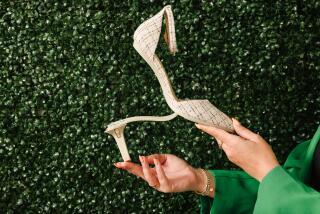Female entrepreneurs draw on life ‘in the trenches’
- Share via
Rachael Smith took a personal experience and turned it into a business.
Lugging two young children through the airport — while digging through her bag to find a favorite toy to calm her son — inspired her to invent a diaper bag with a pullout drawer and lots of pockets.
“So many bags are beautiful but have no function,” Smith said. “You can’t find what you need.”
Women see business opportunities in everyday life, which gives them a good notion of what consumers might want. As many as 8 out of 10 businesses launched by women offer products and services for consumers, not businesses, also because they find the consumer market more accessible, said Victoria Colligan, founder of Ladies Who Launch, which offers resources and networking opportunities for women entrepreneurs.
“Women are the household managers,” said Carol Dougal, co-president and one of the founders of the Women’s Business Development Center in Chicago. “They are the biggest shoppers.”
Still, having an epiphany is not the same as bringing a product to market.
“Few people actually develop an idea, take it to market and are successful at it,” said James Lynch, owner of Biggest Possible Future, a business coaching firm in Deerfield, Ill.
Smith tapped a contact with corporate sales experience to be her chief operating officer, and her resolve carried her forward, Lynch said.
Chicago inventor Lori Greiner’s first product was a jewelry organizer that could store 100 pairs of earrings. By the end of her first year in business, she had sold about $1 million worth of organizers in J.C. Penney Co. stores and on the Home Shopping Network.
More than 250 products and 14 years later, Greiner is a regular on QVC, with a monthly program called “Clever & Unique Creations by Lori Greiner.” She has introduced 30 to 40 new products a year, including cosmetics organizers and cooking utensils.
“I have an innate instinct for knowing what’s going to work,” she said. Her company, For Your Ease Only Inc., has had more than $350 million in sales since it began in 1996, she said.
New product ideas came easily to Greiner — the hard part for her was getting retailers’ attention.
With a directory of retailers she found at a public library, Greiner started calling the largest ones. Most wouldn’t return her calls, but Greiner’s persistence paid off when J.C. Penney agreed to put the jewelry organizer in Chicago stores and take it nationwide if it did well. By demonstrating the product, Greiner boosted sales and won the national account.
A successful stint on the Home Shopping Network led to an appearance on QVC in Britain, which in turn led her to QVC in the U.S.
Finding a major customer is crucial to succeeding with low-priced products.
“With a small household product, you don’t get the big bucks or profit margin quickly,” Dougal said. “It takes an awful lot of diaper bags to make a lot of money.”
It took Smith about a year to raise the capital to launch the business and create a prototype.
“You need $100,000 or more to get a business like this off the ground,” Smith said.
Smith got her foot in the door at Kmart through networking with other mothers at playgroups. One friend knew someone whose sister worked at Kmart, and she invited Smith to make a pitch in June 2009.
By January, Smith’s diaper bags were selling in Kmart stores for about $25, while specialty boutiques sell deluxe versions for as much as $130.
“New ideas can come from anyone,” said Cheryl Olinger, general merchandise manager at Sears Holdings Corp., which owns the Sears and Kmart retail chains.
Although some female inventors downplay their gender, Smith touts her mothering role as an asset to her business. Mrs. Smith’s Diaper Bags convert from shoulder bags to backpacks for hands-free carrying. Besides the organizer drawer at the bottom, they come with key hooks, padded sunglass cases and washable, full-size changing pads.
“This is all about being a real mom in the trenches who needed a bag” that was fashionable and functional, she said.
business@latimes.com
More to Read
Inside the business of entertainment
The Wide Shot brings you news, analysis and insights on everything from streaming wars to production — and what it all means for the future.
You may occasionally receive promotional content from the Los Angeles Times.










